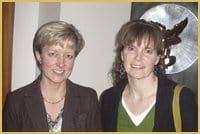The decision of St John’s Shaughnessy Anglican Church to split from the bishop of New Westminster is not about sexuality or homophobia, according to church leaders who say the issue of same-sex blessings is only the tip of the iceberg.
On Feb 13 members of St John’s Shaughnessy Anglican Church passed a resolution to leave the gay-friendly diocese of New Westminster and realign with the conservative Anglican Network in Canada, which is affiliated with the Anglican Province of the Southern Cone in South America.
“It is not about sexuality,” insists Cheryl Maczko-Chang, a director of the Anglican Network in Canada and a member of St John’s Shaughnessy. “I know many homosexual people. As a lawyer I represented homosexual clients. I have friends I would consider to be deep friends who are homosexual. This is not about homophobia. But I cannot tell them that the Bible says something it doesn’t.”
For Maczko-Chang the decision to leave the diocese and the Anglican Church of Canada is about irreconcilable differences on Scripture.
“What you don’t appreciate is that same-sex blessings is nothing more than the tip of the iceberg,” she says. “It’s the massive body underneath that’s most important to us from a spiritual perspective. We are being asked to deny our faith, to deny what the gospel says.”
Church spokesperson Lesley Bentley says gay people are loved by Christ, but gay relationships are not Biblically condoned.
“If this is perceived as homophobic it’s a wrong perception and a wrong understanding,” says Bentley. “If we were homophobic then gay people wouldn’t be attending this church. We deplore violence, discrimination and hatred toward any group but we also don’t believe we have to affirm.”
“We deal with the holistic lives of all people — homosexuals within our community as well as within our congregations — just like we deal with the lives of people who are dealing with issues of pornography, people who are dealing with financial problems, people who are dealing with relationship problems,” she adds.
Steve Schuh, an openly gay member of St John’s, disagrees with his church’s interpretation of the Bible.
“As an example they’ll point to the story Sodom and Gomorrah of how much God hates homosexual sex. But even the neutral observer would notice that that text is about sex with angels; not about sex between men but threats of violence against angels. But even if it were about homosexuality the second thing we’d have to notice is that it’s a story about violence. It’s threatened gang rape so what does that have to do with committed same-sex loving couples today? Of course the Bible condemns that act in one case, but that doesn’t necessarily mean it condemns it in another.”
Schuh was one of 11 people who voted against the resolution and the only one to stand up and speak against it.
“There were about 10 people who spoke. All of the other ones were greeted with applause and sometimes cheers and amens, but they were stone silent after I spoke,” he notes.
He says his attempts to engage his church on discussions about the Bible have been fruitless.
“They have been preaching in this direction for the last six years and the rhetoric has been consistent in setting this up as a truth against the world, one true gospel against all the counterfeits, it’s a black and white. They don’t see any shade of grey, don’t see any value in discussing the bigger issues with those who might disagree.”
In its motion to realign with the Province of the Southern Cone through the Anglican Network in Canada, St John’s cites the failure of the diocese to uphold certain church resolutions, including the Windsor Report and the Lambeth Resolution. These resolutions state that same-sex blessings are incompatible with Scripture. Schuh points out that these same reports also underscore the authority of bishops in the church.
“What’s interesting about that is those exact statements also condemn what they are doing, which is violating diocese boundaries and authority. All of our clergy in the diocese are licensed by the bishop. They have the authority to do what they do because they are licensed by the bishop. In any other kind of employment situation the CEO would have fired them years ago.”
In a letter posted on the New Westminster diocese website, Acting Bishop Peter Elliott says the decision of St John’s to split is not sanctioned or recognised by the Anglican Communion.
“The Anglican Church of Canada is in communion with the Archbishop of Canterbury, who has recently said that he can neither support nor sanction the intervention of a Primate from another jurisdiction into the life of a Province of the Anglican Communion.”
St John’s Shaughnessy isn’t the only parish severing ties with the Anglican Church of Canada. Just days after the St John’s meeting, St Mary’s in Metchosin and Abbotsford’s St Matthew’s and Holy Cross churches voted to leave as well, as did Hope’s Church of the Resurrection and St John’s Richmond last November.
On Feb 24, two more Lower Mainland churches, St Matthias and St Luke and Vancouver’s largest Chinese Anglican church, the Church of the Good Shepherd, also voted to leave, bringing the total number of dissident Anglican churches in BC and Ontario to more than a dozen.
Check out Xtra.ca’s video report from
the St John’s Shaughnessy vote below:

 Why you can trust Xtra
Why you can trust Xtra


